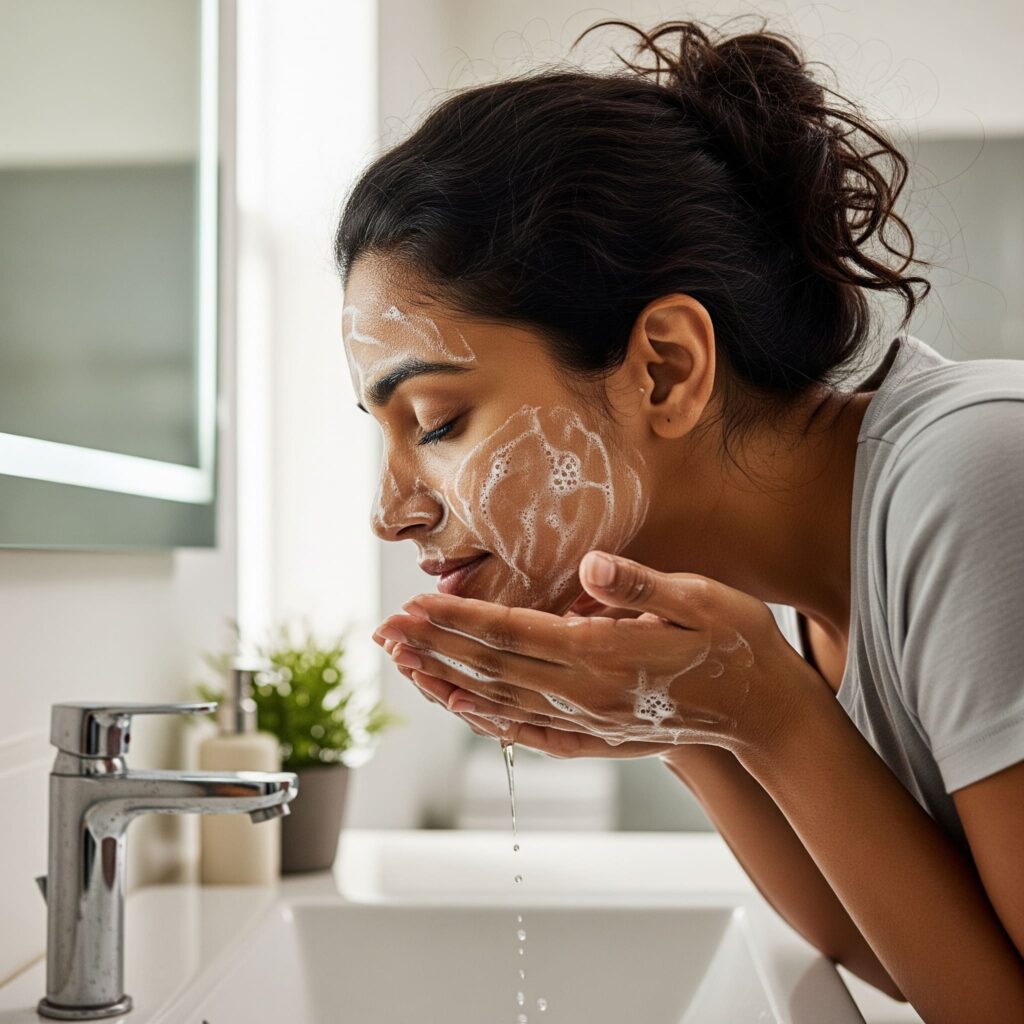The key difference between a cleanser and a face wash lies in their primary function and formulation. Cleansers are generally more gentle and hydrating, often used for removing makeup and surface impurities, while face washes are typically designed for deeper cleansing, especially for oily or acne-prone skin, and may have a foaming or lathering effect.
When choosing the right product for your skincare routine, understanding face cleanser vs face wash is essential. Many people confuse these terms, but face cleanser vs face wash serve different purposes for your skin. This guide will help you explore the main differences between face cleanser vs face wash and decide which suits your skin type best.
Table of Contents
What is a Cleanser?
A face cleanser is generally a mild, often cream-based or oil-based product designed to gently remove dirt, makeup, excess oils, and impurities from your skin while preserving its natural moisture balance. When comparing face cleanser vs face wash, it’s important to note that cleansers focus on cleansing without stripping the skin of essential oils or causing dryness, unlike some face washes that can be harsher.

Understanding the difference between face cleanser vs face wash helps you choose the right product for your skin type. Many prefer a face cleanser because it often comprises moisturizing and nourishing ingredients tailored to soothe and maintain the skin barrier, making the choice in the face cleanser vs face wash debate crucial for healthy skin.
Cleanser Key Features
When choosing the right product for your skincare routine, understanding the difference between a face cleanser vs face wash is essential. The primary difference lies in their formulation and purpose-face cleanser vs face wash offers distinct benefits depending on your skin type and concerns. If you’re confused about which is better, knowing the key features of each can help you decide between face cleanser vs face wash to achieve a clear, healthy complexion.
- Typically cream, lotion, or oil-based with a rich texture
- Gentle formula suitable for all skin types, especially dry and sensitive skin
- Cleanses by dissolving makeup, sunscreen, and impurities without harsh foaming
- Maintains skin hydration and prevents irritation
- Leaves skin feeling soft and smooth, not tight or stripped
Benefits of Using a Face Cleanser
Using a face cleanser offers many benefits for maintaining healthy and glowing skin. When deciding between face cleanser vs face wash, it’s important to know that a face cleanser gently removes dirt, makeup, and impurities without stripping natural oils, making it ideal for dry or sensitive skin. In the face cleanser vs face wash debate, cleansers tend to hydrate and nourish the skin while cleansing, unlike face washes that provide a deeper but sometimes harsher cleanse. Overall, understanding the difference in face cleanser vs face wash can help you choose the best option for your skin type and achieve a balanced, refreshed complexion.
- Removes makeup, pollutants, and grime effectively without overdrying
- Gently cleanses sensitive or dry skin while preserving moisture
- Balances skin’s pH and supports a healthy skin barrier
- Reduces the risk of irritation and redness often caused by harsher cleansers
- Prepares skin to absorb other skincare products better

How to Use a Face Cleanser for Optimal Results
Understanding the difference between a face cleanser vs face wash is important to choose the right product for your skincare routine. To get optimal results, start by selecting a face cleanser that suits your skin type, as cleansers tend to be gentler and help maintain your skin’s natural moisture. When using a face cleanser vs face wash, remember that cleansers often have a creamier texture and are designed to remove makeup and surface impurities without stripping your skin. For best results, apply your face cleanser twice daily, gently massaging it onto damp skin and rinsing thoroughly with lukewarm water.
- Apply a small amount to dry or slightly damp skin
- Massage gently in circular motions focusing on the face and neck
- Rinse with lukewarm water or remove with a soft cloth, depending on the product instructions
- Use twice daily, morning and night, to maintain cleanliness without disrupting moisture balance
Discover which is better: BB Cream or CC Cream in this quick guide!
What is a Face Wash?
A face wash is a water-based product designed for deeper cleansing by removing excess oil, dirt, and impurities using surfactants that produce a foamy lather. When comparing face cleanser vs face wash, the latter is more suited to cleansing the skin thoroughly, especially for oily, combination, or acne-prone skin types.

Understanding the difference in face cleanser vs face wash helps in choosing the right product, as face washes can sometimes be more drying if overused or if the formula is too strong for your skin. So, knowing the role of each product in the face cleanser vs face wash debate ensures better skincare results.
Face Wash Key Features
Face wash is an essential part of any skincare routine, designed to deeply cleanse the skin by removing dirt, oil, and impurities that can clog pores and cause acne. When comparing face cleanser vs face wash, one key difference is that face wash is often formulated to produce a rich lather that gently exfoliates and refreshes the skin’s surface. Understanding the benefits of face cleanser vs face wash helps you choose the right product tailored to your skin type-face wash typically offers thorough pore cleansing and better oil control, making it ideal for daily use. Many prefer face wash over other cleansers because it balances pH, hydrates the skin, and promotes a clear, radiant complexion with regular use.
- Usually gel, foam, or liquid-based with foaming agents
- Designed to deeply cleanse pores by dissolving oil and debris
- Often contains active ingredients like salicylic acid or benzoyl peroxide for acne control
- Suitable for oily, combination, or acne-prone skin to manage shine and breakouts
- Leaves skin feeling refreshed, sometimes with a tightening sensation
Key Properties of Face Washes
When choosing between a face cleanser vs face wash, it’s important to understand their distinct roles. A face wash typically offers a deep, foaming cleanse that removes dirt and excess oil effectively, making it ideal for oily or acne-prone skin. On the other hand, a face cleanser vs face wash comparison shows that cleansers are usually gentler, designed to maintain the skin’s natural moisture balance while cleansing softly, suitable for dry or sensitive skin. To optimize your skincare routine, knowing when to use a face cleanser vs face wash can help you achieve clearer, healthier skin tailored to your needs.
- Surfactants that generate foam and cleanse deeply
- Ingredients targeting excess oil and acne prevention
- May have exfoliating elements for dead skin removal
- Can vary from gentle formulations to intense deep cleansers based on skin needs

Benefits of Using a Face Wash
Using a face wash is essential for maintaining clean and healthy skin. When deciding between a face cleanser vs face wash, it’s important to know that a face wash provides a deep clean by removing excess oil and impurities from your pores. Many people wonder about the key differences in a face cleanser vs face wash, as cleansers tend to be gentler and more moisturizing, while face washes offer a refreshing, thorough cleanse. Understanding the benefits of face cleanser vs face wash can help you select the right product for your skin type and ensure a bright, clear complexion every day.
- Removes dirt, sweat, excess oil, and environmental pollutants effectively
- Unclogs pores to prevent acne and blackheads
- Helps control oiliness for very oily skin types
- Refreshes the skin and reduces shine
- Promotes clearer skin with regular use when choosing the right formula
Discover the key differences between balayage and ombre in this blog!
Key Differences: Face Cleanser vs Face Wash
Understanding the face cleanser vs face wash debate helps you choose the right product for your skin type. When comparing face cleanser vs face wash, the main difference lies in their purpose: cleansers gently remove makeup and impurities, while face washes provide a deeper clean. To get the best results, know when to use a face cleanser vs face wash based on your skin’s needs.
| Feature | Face Cleanser | Face Wash |
| Texture | Cream, lotion, oil-based, rich and moisturizing | Gel, foam, or liquid, often with foaming surfactants |
| Cleansing Action | Gentle, dissolves makeup and impurities without drying | Deep cleansing that removes oil and residue |
| Suitable Skin Types | Dry, sensitive, normal, and combination | Oily, acne-prone, combination, and normal skin |
| Effect on Skin | Maintains moisture, gentle on skin barrier | Can be drying if overused or for sensitive skin |
| Frequency of Use | Daily, even for sensitive skin | Daily or as needed based on skin type and oiliness |
| Typical Ingredients | Moisturizers, oils, antioxidants | Surfactants, exfoliants, acne-fighting ingredients |
Learn the key differences between cleanup and facial treatments in this blog.
Face Cleanser vs Face Wash: Which One is Right for You?
When deciding between face cleanser vs face wash, it’s important to understand their differences. Many people wonder whether a face cleanser vs face wash is better suited for their skin type. Choosing the right product when comparing face cleanser vs face wash can make a big difference in your skincare routine.
- Skin Cleanser vs Face Wash: If your skin is dry, sensitive, or easily irritated, a face cleanser is usually better because it cleanses without stripping natural oils.
- For very oily skin or acne prone skin, a face wash, especially a deep cleansing face wash for oily skin, helps manage oil production and keeps pores clear.
- If you have combination skin, you may use a face cleanser in the morning and a face wash at night to balance cleansing and hydration.
- For face cleanser for dry skin, choose gentle, hydrating formulas that support moisture without foam or harsh detergents.
- Those with sensitive skin should opt for mild, fragrance-free cleansers that are free of alcohol and sulfates.
- For face wash for oily and acne prone skin, look for products with salicylic acid, witch hazel, or tea tree oil to reduce blemishes and excess oil while avoiding dryness.
- When deciding which is better face wash or cleanser, consider your daily skin needs, sensitivities, and any specific skin concerns.
Discover different types of hair treatments to find the perfect care for you!
Conclusion
Understanding the difference between face cleanser vs face wash helps you customize your skincare for the best results. Face cleansers provide gentle, nourishing care that preserves your skin’s natural barrier, making them ideal for dry and sensitive skin. Face washes offer thorough cleansing, ideal for oily and acne-prone skin types needing deep pore cleansing. When deciding between face cleanser vs face wash, choosing the right product based on your skin type and concerns-whether a deep cleansing face wash for oily skin or a face cleanser for sensitive skin-can enhance your skin health, leaving you with a radiant and balanced complexion.
For personalized beauty parlour services tailored to your needs, visit Peacock Salon in Vashi, Navi Mumbai. Our expert beauticians specialize in a wide range of treatments to enhance your natural beauty. Find us at Mahavir Center, Shop No. 20, 21, 21A, 22, next to Golden Punjab Hotel, Sector 17, Vashi, or call +91 9324774567 to book your appointment and experience top-quality beauty care.
Face Cleanser vs Face Wash – FAQs
What is the main difference between a face cleanser and face wash?
A face cleanser gently removes dirt and makeup while maintaining moisture, whereas a face wash provides deeper cleaning by removing excess oil and impurities, often with foaming agents.
Which is better for oily and acne-prone skin, face cleanser or face wash?
Face washes with acne-fighting ingredients like salicylic acid are better for oily and acne-prone skin due to their deep cleansing and oil-control properties.
Can I use a face cleanser if my skin is very oily?
Yes, gentle face cleansers designed for oily and sensitive skin can balance cleansing without over-stripping natural oils.
What are the benefits of using face wash regularly?
Regular use of face wash removes dirt, excess oil, and pollutants, unclogs pores, prevents acne, and promotes clearer, fresher skin.
Is a face wash suitable for dry and sensitive skin?
Some mild, moisturizing face washes are formulated for dry and sensitive skin, but cleansers often provide gentler hydration and cleansing.
How should I use a face cleanser for best results?
Apply to dry or damp skin, gently massage in circular motions, and rinse with lukewarm water twice daily to maintain clean, hydrated skin.
What key ingredients should I look for in a face cleanser for dry skin?
Look for hydrating ingredients like glycerin, hyaluronic acid, aloe vera, and natural oils that nourish and maintain moisture.
What makes a face wash deep cleansing?
Deep cleansing face washes contain surfactants and exfoliants that penetrate pores to remove oil, dirt, and dead skin cells effectively.
Can face cleansers be used daily?
Yes, face cleansers are typically gentle enough for daily, even twice-daily use, suitable for sensitive or dry skin types.
Which is better, face wash or cleanser for sensitive skin?
Face cleansers are generally better for sensitive skin since they clean gently without irritating or drying out the skin.
